August is Women in Translation Month! So I figured I’d round up some of this year’s best crime novels in translation by women from around the world. Below, you’ll find Norwegian serial killers, Argentinian vampires, French influencers, South Korean lawyers, and so much more (honestly, a lot of French stuff—it’s been a really good year for French noir). A quick shoutout to the amazing publishers and translators who shepherded these works into a language I can read (although I did, once upon a time, read The Girl with the Dragon Tattoo in French. And some Simenon. Not to brag or anything).

Victoria Kielland, My Men
Translated by Damion Searls
(Astra House)
Nasty, brutal, and short, Victoria Kielland’s My Men features Norwegian-American lonely hearts killer Belle Gunness, who lured widowers and their children to her farm with the promise of care and inheritable land, then slaughtered both her lovers and their families. The novel frames Gunness’ murderous quest as an almost-inevitable perversion of the American Dream. Kielland’s lyrical, abstract, and visceral prose, capably translated by Damion Searls, has won acclaim in her native Norway and is a beguiling match to her terrifying subject matter.
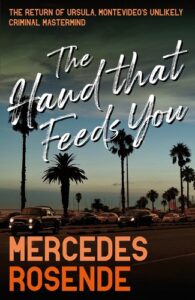
Mercedes Rosende, The Hand that Feeds You
Translated by Tim Gutteridge
(Bitter Lemon)
Set in Montevideo, Uruguay, from where Mercedes Rosende also hails, The Hand That Feeds You is the sequel to Rosende’s much-lauded Crocodile Tears. Ursula, Rosende’s heroine, is now in possession of all the loot from an armored truck, with robbers, cops, and PIs hot in pursuit. Ursula has plenty of tricks up her sleeve, and given the ineptitude of her pursuers, she’s bound to triumph in the end, but how she does it? Comedic thriller gold.

Paula Rodriguez, Urgent Matters
Translated by Sarah Moses
(Pushkin Vertigo)
In this perfectly paced and plotted Argentine thriller, a train crash is the opportunity one criminal needs to change his identity and go on the run. Unfortunately, one of the detectives hunting him just isn’t ready to let the case go, and he’s ready to use questionable methods to track down his target. What follows is one of the most delightful cat-and-mouse thrillers I’ve read in quite some time.
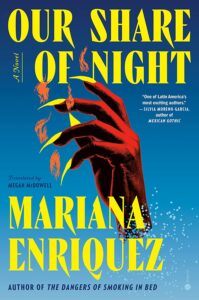
Mariana Enriquez, Our Share of Night
Translated by Megan McDowell
(Hogarth)
What a strange and luminous novel. Mariana Enriquez stunned with her collection The Dangers of Smoking in Bed, and Our Share of Night is just as fantastic (and fantastical). Beginning in Argentina in the years of the dictatorship, Our Share of Night follows a father and son on a grief-driven road trip as they mourn the loss of the woman who united them, her dangerous (and possibly immortal) family close in pursuit. A dark vampiric noir that heralds a new era in South American horror.

Isabelle Autissier, Suddenly
Translated by Gretchen Schmid
(Penguin Books)
Isabelle Autissier has sailed the world alone, becoming the first woman to do so in a competition, and this survival thriller speaks to the experience of the author. In Suddenly, a French couple sets off on an epic journey, only to find themselves stranded on a remote island in the Antarctic Ocean. This is no Blue Lagoon or Robinson Crusoe—Autissier’s characters will be tested severely, and found wanting.
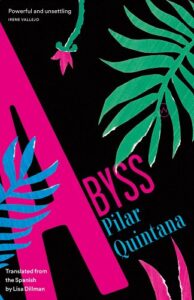
Pilar Quintana, Abyss
Translated by Lisa Dillman
(Bitter Lemon)
A young girl grapples with the complexities of the adult world in this moody psychological thriller. Her mother is deeply depressed, flourishing only when tending to her plants or in the arms of her lover, and her father is older, absent, and unable to process emotions. The father finds out about the lover, who disappears, and the family heads to a modern home in the Columbian mountains to recover their intimacy; the home, like the mother, is beautiful and cold, and its former mistress went out one night in her car and never returned…
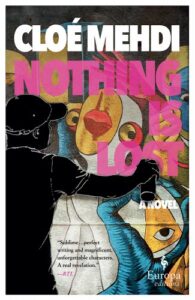
Chloé Mehdi, Nothing Is Lost
Translated by Howard Curtis
(Europa)
This pitch-dark French noir explores the aftermath of violence and the questions still unanswered in the wake of a teen’s murder by police. 11-year-old Mattia spends his days emotionally managing the adults around him, trying to keep his teachers from realizing he’s gifted, and thinking hard about the murder of 15-year-old Said during a police identity check. As he considers the life and death of Said, he puts together the larger puzzle of oppression in the heavily policed suburbs. Mehdi’s writing conjures the best of French noir, and reminds us why the French named the genre.

Maud Ventura, My Husband
Translated by Emma Ramadan
(HarperVia)
My Husband is a sly psychological thriller about a marriage that is not what it seems. A woman passionately in love with her husband keeps a detailed diary of his slights and insults, punishing him accordingly in the name of balance. Surprisingly comical and deeply insightful, My Husband is not to be missed.

Louise Mey, The Second Woman
Translated by Louise Rogers Lalaurie
(Pushkin Press)
The Second Woman is at once a chilling psychological thriller and a visceral exploration of internalized misogyny and the mechanics of abuse. The woman of the title is the new partner of a man suspected of involvement in the disappearance of his wife. When the wife returns, with seemingly no memory of him or her son, a game of cat and mouse begins, between the detective and the husband, and between the narrator’s wishful hopes and her slow acknowledgement of her dark reality.
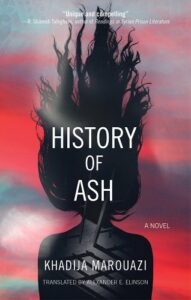
Khadija Marouazi, History of Ash
Translated by Alexander Elinson
(Hoopoe)
Hoopoe Editions is dedicated to bringing English language audiences the best in Arabic literature, and History of Ash does not disappoint. In this devastating, lyrical novel of struggle, two prisoners in Morocco, a man and a woman, narrate their journey of resistance, imprisonment, and release during the “Lead Years” of the 1970s and 80s.

Leonie Swann, The Sunset Years of Agnes Sharp
Translated by Amy Bojang
(Soho)
Leonie Swann may write in German, but she’s set this darkly comic murder mystery in a retirement community in the English countryside. The inhabitants of Sunset Hall are shocked when one of them is murdered, then even more surprised when a detective comes by to investigate a different murder next door. Can they conceal the first body long enough to pin the murder on whoever was responsible for the corpse next door? And what does a tortoise have to do with it?
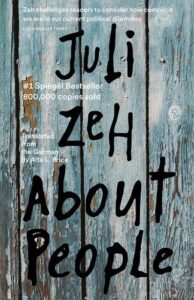
Juli Zeh, About People
Translated by Alta L. Price
(World Editions, October 3)
At the peak of the pandemic, a woman splits with her boyfriend over his increasingly rigid commitment to environmentalism and heads to the German countryside. The new home needs unexpected work, she and her dog promptly clash with their menacing neighbor, and unexplained things are happening all around her. This literary thriller is an intense exploration of fear and isolation.
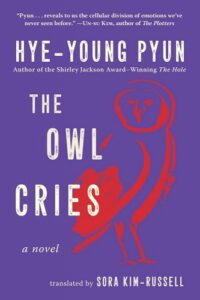
Hye-Young Pyun, The Owl Cries
Translated by Sora Kim-Russell
(Arcade, October 3)
Hye-Young Pyun’s stunning psychological thrillers delve deep into the horrors of being human and the oppressive mechanics of modern society, and The Owl Cries demonstrates a writer at the top of her game. In The Owl Cries, a ranger has vanished from a mysterious forest and its secluded company town of loggers and researchers. His brother, a divorce lawyer, embarks on a lackadaisical investigation into the disappearance, but soon finds himself mired in the town’s corruption and enmeshed in its secrets.

Marie NDiaye, Vengeance is Mine
(Translated by
(Astra House, October 17)
In Marie NDiaye’s sinister and spellbinding new novel, a lawyer is hired by the husband of a woman accused of murdering her three children, despite her lack of experience in high-profile trials. Meeting him unlocks memories for her of a childhood visit to a palatial home, perhaps occupied by the husband’s family, and wonders if she perhaps met her new client when she was 10 and he was 15. But what happened between them? And why can’t she remember the details? Half suspense novel, half dark fairy tale, Vengeance is Mine is a literary tour-de-force.
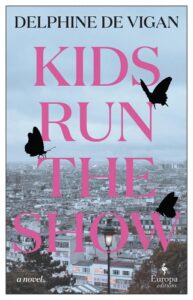
Delphine de Vigan, Kids Run the Show
Translated by Alison Anderson
(Europa, November 28)
Damn, this book got dark. Like, you think it can’t get any darker, then it does. In Kids Run the Show, the younger child of a prominent mommy vlogger is kidnapped, and as the search continues, the reader begins to wonder if the child might be better off wherever they are than at home being constantly filmed. De Vigan has written a blistering critique of influencer culture, the erasure of privacy, and the exploitation of children. The prophetic ending takes us decades into the future to contemplate the psychological wounds of a generation raised to perform on the internet, for a deeply unsettling experience.
Adblock test (Why?)




















